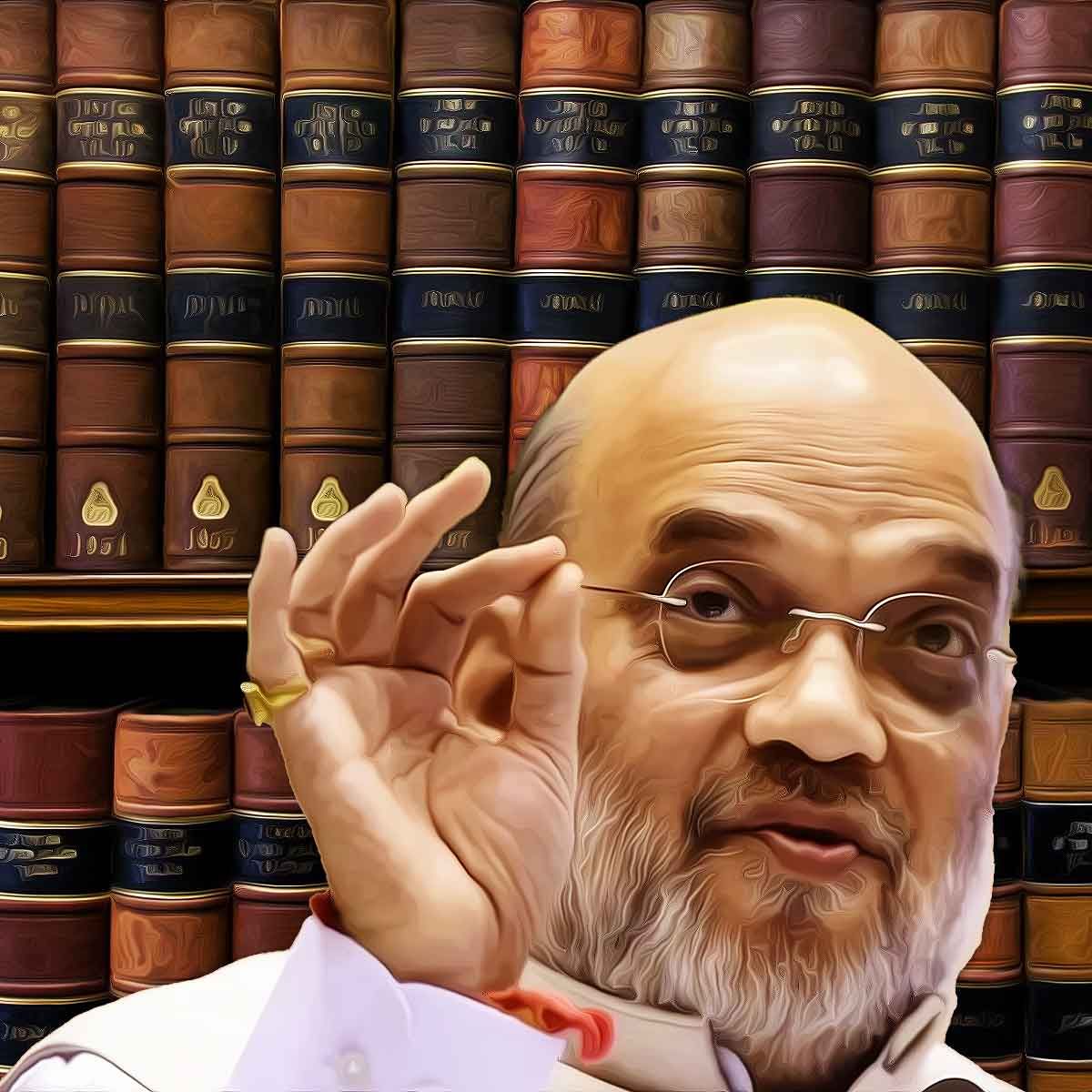More Coverage
Twitter Coverage
Satyaagrah
Written on
Satyaagrah
Written on
Satyaagrah
Written on
Satyaagrah
Written on
Satyaagrah
Written on
JOIN SATYAAGRAH SOCIAL MEDIA
"From colonial past to a just and fair future": Amit Shah introduces new bills replacing IPC & CrPC, targeting sedition, mob lynching & deceitful relations, emphasizing citizens' rights and timely justice through a major shift in India's criminal justice

In an assertive move away from the chains of colonialism, Union Home Minister, Amit Shah, presented three groundbreaking bills on Friday that promise to usher India into a new era of justice. These proposed laws aim to replace the Indian Penal Code (IPC), the Code of Criminal Procedure (CrPC), and the Indian Evidence Act — all relics from the British Raj.
|
|
One of the key highlights of the Bharatiya Sanhita Suraksha Bill is Section 150. This provision reflects the Law Commission of India's suggestion made earlier in June. The recommendation? To amplify the alternative punishment for sedition from a mere three years to a staunch seven.
Unraveling the intent behind these bills, Shah passionately expressed that the very laws set to be cast aside had a singular goal: fortifying the British reign. Their essence wasn’t about meting out justice; instead, they were instruments of punitive measures. However, the trio of new bills, namely the Bharatiya Nyaya Sanhita Bill, the Bharatiya Nagarik Suraksha Sanhita Bill, and the Bharatiya Sakshya Bill, are built on a contrasting ethos. They pledge allegiance not to a foreign power but to every Indian citizen, vowing to guard their rights.
Clearing any clouds of doubt, Shah emphasized that the focal point of these laws won't be mere punishment. Instead, their foundation lies in delivering justice, symbolizing a robust stance against terrorism, mob lynching, and heinous crimes against women. "Imagine," Shah proclaimed in the Lok Sabha, "from 1860 to 2023, we've been governed by laws crafted by the British. It's time for an overhaul, for laws crafted by Indians, for Indians."
In an atmosphere charged with fervor, Shah recalled Prime Minister Narendra Modi's resolute declaration from the previous year. Standing tall at the Red Fort on August 15, Modi had pledged to eradicate remnants of colonial rule. And now, these three bills are a manifestation of that solemn vow.
|
|
But what do these reforms practically imply for the common Indian?
For starters, more efficient legal machinery. Shah shared the ambitious aim of pushing the conviction rate beyond 90%. Highlighting the need for impeccable evidence collection, he insisted on the presence of forensic teams at crime scenes, especially for grave offences. This move, he believes, would dramatically reduce the odds of culprits slipping through the justice net.
But that’s not all. The wheels of justice, often criticized for their slow pace, are set to gain momentum. Shah envisions a digitized future, aiming to fully computerize all courts by 2027. For victims of sexual assault, there’s more in store. Recording their statements won’t be a mere procedure but will be diligently video-recorded, ensuring clarity and transparency.
Drawing attention to the often-prolonged police investigations, Shah assured a revamp. Soon, charge sheets must be filed promptly within 90 days of registering complaints. Investigations won't drag on indefinitely but will conclude within a tight 180-day timeframe. And once charges are framed? Judges will have a maximum of 30 days to deliver their verdicts. The days of prolonged waits for court orders are numbered, with judgments being published online within a week.
Delving back into the Bharatiya Sanhita Suraksha Bill, it's evident that the Law Commission’s suggestions play a pivotal role. While they advocated retaining the 153-year-old colonial sedition law, they emphasized its refinement. Their aim was to infuse clarity into IPC Section 124A (pertaining to sedition) ensuring it's judiciously and aptly used. Moreover, they proposed enhancing the law’s alternative punishment to seven years, urging courts to calibrate penalties based on the severity of the crime.
However, the sedition law hasn't been without controversy. Last year, the Supreme Court momentarily suspended Section 124A, flagging its misalignment with contemporary values. The archaic law, they argued, didn't resonate with today’s dynamic social fabric. Moreover, several activists and legal experts have often pointed out its potential misuse, particularly to suppress dissent.
In wrapping up, this monumental shift in India's legal landscape is not just about introducing new laws. It's a clarion call, signaling India's decisive move from a colonial past towards a future shaped by its own people, values, and aspirations.
|
|
A bold revamp: Amit Shah ushers in a new dawn for Indian Criminal Laws
On a transformative day in the Lok Sabha, Union Home Minister Amit Shah painted a picture of the Indian criminal justice system's future — one that promises to be progressive and aligned with the aspirations of modern India. The epicenter of this reform? Three formidable bills that are set to redefine how justice is meted out in the country.
Out with the Old: Amit Shah didn’t mince words when he introduced the Bhartiya Nagrik Suraksha Sanhita Bill, 2023; Bharativa Nyaya Sanita Bill, 2023; and Bharativa Sakshva Bill, 2023 to the Lok Sabha. Their core aim? To phase out ancient laws such as the Indian Penal Code from 1860, the Criminal Procedure Code from 1898, and the Indian Evidence Act from 1872. Shah's rationale was powerful. He described these laws as remnants of "gulami" or servitude, signifying India's subjugation under British colonialism. It's a poignant reminder that these laws were crafted not for an independent India, but for a nation under the yoke of the British Empire.
Sedition's Swan Song: In a move that's bound to be dissected and debated, Shah declared the sedition offense, long a part of the Indian Penal Code, will be wholly eradicated. This symbolic move signifies India's stride towards a more mature democracy, unshackled from colonial-era restraints.
|
|
Tougher Stance on Mob Lynching: Mob lynching has tragically made headlines in India too often. Addressing this, Shah unveiled plans for introducing capital punishment for those found guilty of such crimes. A stern stance meant to act as a deterrent for such brutal acts of lawlessness.
313 Changes on the Horizon: Shah elucidated that the Bharatiya Suraksha Sanhita Bill, 2023 is just one part of a more extensive overhaul. An astounding 313 modifications are in the pipeline for India's criminal justice system, emphasizing the sheer scale and depth of these reforms.
Boosting Conviction Rates: With a vision to enhance the efficacy of the justice system, Shah announced an ambitious target: pushing the conviction rate beyond 90%. Central to this mission is the mandatory involvement of forensic teams, especially in grave offenses, ensuring evidence collection is rigorous and unimpeachable.
Justice over Punishment: In his Lok Sabha address, Shah stressed that the outgoing laws, embedded in the legacy of British governance, were more punitive than just. Their primary function was to fortify British rule. The trio of new bills, however, flips the script. They aim to uphold and safeguard the rights of the Indian populace.
The Drive for Swift Justice: Shah reflected on the painstakingly long process that led to these bills. Four years of deliberations, with feedback from myriad stakeholders, have culminated in laws that prioritize the safety of citizens and the timely delivery of justice.
Ensuring Police Accountability: A crucial facet of these new bills is the emphasis on accountability. Shah pledged checks and balances to prevent potential misuse of power by the police. He also expressed an eagerness for suggestions and perspectives, inviting inputs from the Bar Council of India and the Law Commission, among others.
Trials for the Absentee Accused: In a bid to avoid delays and escape routes, Shah announced that the new laws will facilitate the trial of accused individuals, even if they are on the run.
Clear Definitions for Grave Offences: To eliminate ambiguities, Shah highlighted that acts like 'separatism' and 'waging war against the country' will be distinctly categorized as individual offenses under the proposed laws.
All in all, these reforms signify a watershed moment in India's legal journey. Breaking away from antiquated laws and evolving with the times, India aims to foster a justice system that truly mirrors its democratic ethos and the collective aspirations of its citizens.
|
|
Amit Shah takes a stand against 'Love Jihad' with New Bill on Deceitful Relations
In a momentous announcement, Union Home Minister Amit Shah has taken the legal fight against deceitful relationships to new heights. By introducing the Bharatiya Nyaya Sanhita, the Narendra Modi government has made a clear and unambiguous statement that the exploitation and deception of women will no longer be tolerated in India.
Sexual Relations under False Pretences – A Crime: A standout provision in this new bill is the clear criminalization of establishing sexual relationships through the use of deceit, including false promises or assuming a false identity. This measure aims to tackle the deeply concerning issue of 'Love Jihad', where individuals, typically from the Muslim community, misrepresent their identity to entrap women from other religions, such as Hinduism or Sikhism. This deceit often involves men posing as members of a different religion to foster relationships with unsuspecting women.
While relationships founded on false promises of marriage have previously been punishable by law, the new bill delves deeper. The Narendra Modi government is now addressing the lacuna that existed in the justice system, where many deceit-based relationships, especially those involving concealing one's true identity, were left to the courts' discretion. The outcome varied, with some perpetrators being convicted, while others walked free. With the new bill, such acts will be definitively classified as offenses, and it's anticipated that the rate of convictions will see an upswing.
Protection of Women and Children Takes Center Stage: Amit Shah, during his address to the Lok Sabha, was met with widespread applause as he underscored that the Bharatiya Nyaya Sanhita would give precedence to crimes against women and children. This commitment signifies a larger initiative by the government to prioritize the security and dignity of the most vulnerable sections of the society.
Enhanced Penalties for Graver Crimes: Further fortifying the nation's stance against heinous crimes, Amit Shah declared rigorous penalties for all members involved in gang rapes — a minimum jail term of 20 years, potentially even life imprisonment. Additionally, reflecting the nation's zero-tolerance policy towards crimes against minors, the bill introduces the death penalty for those convicted of raping minors.
A New Dawn for India’s Justice System: With these landmark provisions, the Bharatiya Nyaya Sanhita Bill is sending a strong message to perpetrators of deceit and violence. It underscores the commitment of the Narendra Modi government to protect its citizens, especially women and children, and ensure justice is not only served but is also unequivocal and swift.
The introduction of this bill is indeed a momentous stride in India’s legal trajectory, proving once again that as times change, the nation's legal apparatus is ready and willing to adapt to protect its citizens better.
 Support Us
Support Us
Satyagraha was born from the heart of our land, with an undying aim to unveil the true essence of Bharat. It seeks to illuminate the hidden tales of our valiant freedom fighters and the rich chronicles that haven't yet sung their complete melody in the mainstream.
While platforms like NDTV and 'The Wire' effortlessly garner funds under the banner of safeguarding democracy, we at Satyagraha walk a different path. Our strength and resonance come from you. In this journey to weave a stronger Bharat, every little contribution amplifies our voice. Let's come together, contribute as you can, and champion the true spirit of our nation.
 |  |  |
| ICICI Bank of Satyaagrah | Razorpay Bank of Satyaagrah | PayPal Bank of Satyaagrah - For International Payments |
If all above doesn't work, then try the LINK below:
Please share the article on other platforms
DISCLAIMER: The author is solely responsible for the views expressed in this article. The author carries the responsibility for citing and/or licensing of images utilized within the text. The website also frequently uses non-commercial images for representational purposes only in line with the article. We are not responsible for the authenticity of such images. If some images have a copyright issue, we request the person/entity to contact us at This email address is being protected from spambots. You need JavaScript enabled to view it. and we will take the necessary actions to resolve the issue.
Related Articles
- “We know what we are, but know not what we may be”: Every human being has right to choose his or her gender identity: Rajasthan High Court ordered authorities to consider changing the records of a man who secured a job under the General Female Category
- Madras High Court: Do not take decision on melting Temple gold till Trustees are appointed
- "Abuse is the weapon of the vulgar": Supreme Court to hear PIL for constitution of National Commission for Men, in total of 1,18,979 men suicide in the given year accounted 72% of the total suicide cases whereas women suicide represented roughly 27% only
- "My Shelter Days are over, done, Because you, my master, took me home": Bombay HC imposes fine on citizens feeding strays in public places, "If these so-called friends are really interested in protection and welfare of strays, they must adopt those dogs"
- "गजवा ए हिंद vision 2047": Delhi HC denies bail to ex-PFI chief E Abubacker, highlighting PFI's Vision 2047 to overthrow the government, replace the constitution with Sharia Law, and establish a Caliphate by 2047 through terror camps & radicalizing youth
- "गोलमाल है भाई सब…": Justice Karnan was jailed for naming 20 corrupt judges in a letter to PM, stripped of powers, silenced & declared unfit, while Justice Varma, caught with crores in cash, faced no FIR and reappointed as a judge in Allahabad High Court
- Amit Shah announces transformative shifts in India's criminal laws, aiming to eradicate colonial legacies and emphasize justice over punishment, with tech integration & comprehensive consultations, Shah envisions an efficient, citizen-centric legal system
- "Gone and Back in 35 Minutes": Derek O'Brien's flair for drama got him suspended from Rajya Sabha for some time, between comparing leaders to washing machines and defying the Speaker, O'Brien ensures the Parliament's spotlight remains firmly on him
- "Tradition on Trial: Festivity Faces the Bench": A judicial spark ignites communal debate on tradition as the Kerala High Court orders raid of all religious places to seize illegal crackers; says no holy book commands bursting firecrackers to please God
- "हम-तुम अलग हैं फ़र्क है": In a stunning display of judicial leniency, Pune's wealthy builder’s drunk teen son, who killed two with his Porsche, was swiftly granted bail—only to face the harrowing task of writing a 300-word essay and making traffic boards
- Supreme Court halts Jahangirpuri demolition of illegal encroachments of rioters by NDMC on priority by keeping aside 70,632 pending cases: PIL filed by Jamiat Ulama-I-Hind, Advocate Dushyant Dave, and Kapil Sibal
- In a court case involving rioting, arson, and vandalism during Patidar quota agitation, Gujarat Congress’ president Hardik Patel gets a stay from Supreme Court so he can contest elections: Patel was sentenced to two years in jail
- Notice issued to Central govt on plea challenging the constitutional validity of Waqf Act 1995 by Delhi High Court: Ashwini Upadhyay filed the plea that Waqf Act is antithetical to Secularism in India
- "आखरी सांस": In a historic anti-Naxal operation near the Odisha-Chhattisgarh border, 16 Maoists, including Jairam alias Chalpati with a Rs 1 crore bounty, were killed, weapons like AK-47s seized, and security boosted, with leaders praising the forces
- "जालसाज़": MP High Court punished a journalist with a Rs 25,000 fine for misusing PIL to target a temple on Yashwant Niwas Road, Indore, citing vested interest, lack of evidence, and selective intent instead of genuine public concern, dismissing his plea




























